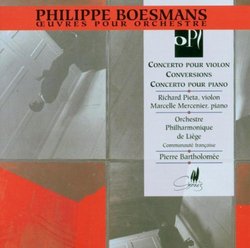| All Artists: Richard Piéta, Marcelle Mercenier, Pierre Bar Title: Philippe Boesmans: Violin Concerto / Conversions / Piano Concerto Members Wishing: 0 Total Copies: 0 Label: Cyprès Original Release Date: 3/21/2005 Release Date: 3/21/2005 Album Type: Import Genre: Classical Styles: Forms & Genres, Concertos Number of Discs: 1 SwapaCD Credits: 1 |
Search - Richard Piéta, Marcelle Mercenier, Pierre Bar :: Philippe Boesmans: Violin Concerto / Conversions / Piano Concerto
 | Richard Piéta, Marcelle Mercenier, Pierre Bar Philippe Boesmans: Violin Concerto / Conversions / Piano Concerto Genre: Classical |
Larger Image |
CD Details |
CD Reviews"Mercy!" cried the Pianist. Giordano Bruno | Wherever I am, I am. | 09/03/2008 (5 out of 5 stars) "Before I get fanciful, let me say that this CD is a "keeper". If you could invest in musical compositions as some people do in paintings, you'd be wise to buy Philippe Boesmans as a long-term prospect.
How to characterize the music of Philippe Boesmans? Atonal, unmelodic, fragmented, percussive, irregular in rhythm and structure, earnest, taxing for the performers, demanding of the listeners, more intuitive than orderly -- all attributes shared by most contemporary composers. So what makes him special? Well, let's see: *atonal? Yes, or perhaps better described as proteo-tonal. Potent surges of tonality emerge from Boesmans' music, especially from the Piano Concerto, as if the notes were locking in briefly to passing waves of familiar tonal patterns. If English has the word "disconcerting", it also needs the word "concerting" to describe Boesmans' agitated tonal assembly. *unmelodic? I wouldn't expect to be able to whistle any themes from Boesmans, yet the splendid outpouring of semi-melodic phrases will grab your attention the way the chaotic warbling of an orchestra-sized mockingbird would. *fragmented? Absolutely. As fragmented as a Cubist painting. Just as classical music depends on memory for its impact, Boesmans' music depends on forgetfulness, on your ability to be totally absorbed by the exact moment of sound as you hear it. *percussive? The piano is, after all, a percussion instrument, and Boesmans explores its percussive reach. He also makes deft, never excessive use of the percusssion instruments beloved of all modernists. It's the Piano Concerto that I respond to most enthusiastically, perhaps because of its masterful blending of pitched and unpitched percussion. *irregular? I imagine that if I studied the scores, I would find structural elements that are not apparent even to careful listeners, but certainly the affect is one of intense spontaneity and freedom, as free as "free jazz" and yet far richer in textures and timbres. *earnest? Yes... and acutely dramatic, ready to assault your acoustic peace of mind, but (you'll be happy to know) NOT depressing! *taxing? As a performing musician, when I look at a score like Boesmans', I often wonder whether modern composers were all behind the door when Mercy was distributed. Pianist Marcelle Mercenier and violinist Richard Pieta very definitely earned their wages in learning the scores of their respective concerti! Pierre Bartholomee and the Philharminic Orchestra of Liege play these fiendish scores as if they were easy. *demanding? You betcha! This is not wallpaper music. It requires undivided attention, both of your ears and of your emotions. For me at least, that attention was rewarded by a deep musical satisfaction. intuitive? Yes, and that's the good news for untrained listeners. You DON'T need an understanding of musical theory, or a huge background in modern music, to appreciate these three compositions. Just listen, and trust your intuition. This performance was funded in part by the government of Belgium (avec l'aide de al Communaute francaise de Belgique); without public funding, it's doubtful that contemporary music would exist." |
